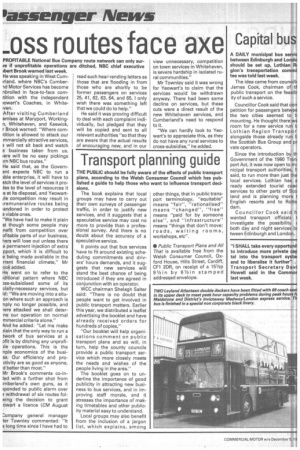Transport planning guide
Page 12

If you've noticed an error in this article please click here to report it so we can fix it.
THE PUBLIC should be fully aware of the effects of public transport plans, according to the Welsh Consumer Council which has published a guide to help those who want to influence transport decisions.
The book explains that local groups may have to carry out their own surveys of passenger traffic, in order to justify new services, and it suggests that a speculative service may cost no more to provide than a professional survey. And there is no doubt about the accuracy of a speculative service.
It points out that bus services have to fit around existing scheduling commitments and drivers' hours demands, and it suggests that new services will stand the best chance of being introduced if they are agreed in conjunction with an operator.
WCC chairman Shelagh Salter said: "There is no doubt that people want to get involved in public transport matters. Earlier this year, we distributed a leaflet advertising the booklet and have already received orders for hundreds of copies," "Our booklet will help organisations comment on public transport plans and so will, in turn, help the county councils provide a public transport service which more closely meets the needs and wishes of the people living in the area."
The booklet goes on to underline the importance of good publicity in attracting new business to bus services, and in improving staff morale, and it stresses the importance of making timetables and other publicity material easy to understand.
Local groups may also benefit from the inclusion of a jargon list, which explains, among other things, that in public transport terminology, "equitable" means "fair", "rationalised" means "changed", "free" means "paid for by someone else", and "infrastructure" means "things that don't move: roads, waiting rooms, workshops, etc".
• Public Transport Plans and All That is available free from the Welsh Consumer Council, Oxford House, Hills Street, Cardiff, CF1 2DR, on receipt of a 151/2p 91/2in by 61/2in stamped add ress,ed envelope.


































































